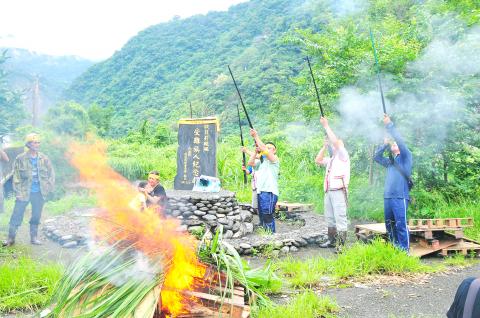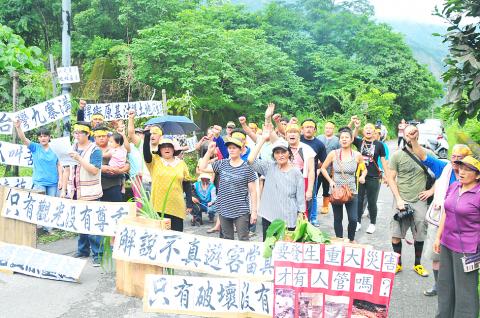Residents of the Truku Aboriginal village of Mukumuqi, a popular tourist attraction in Hualien County because of its natural scenery, yesterday blocked the only road leading to the village in protest against crowds of tourists who the villagers said harm residents’ quality of life and the environment.
Holding up banners reading: “There is only destruction, not ecology,” “There is tourism, but no respect” and “We are not Jiuzhaigou [九寨溝] of Hualien” — referring to a comparison that some tour operators make between the Mukumuqi Gorges and a tourist destination also known for its natural scenery in China — residents stopped minibuses full of tourists at the entrance to the village yesterday.
Prior to blocking the road, the residents performed a ritual at a monument erected in remembrance of 39 villagers who were buried by mudslides triggered by Typhoon Ofelia in 1990 by firing gunshots into the air and sending up smoke signals, declaring to their ancestral spirits their determination to defend their traditional territory.

Photo: Hua Meng-ching, Taipei Times
“It’s not that we do not welcome visitors, but since our village has been opened to outside visitors in 2006, there have been on average more than 100 minibuses bringing in about 3,000 visitors per day on holidays,” village council chairman Masaw said.
“The large number of vehicles has polluted the air, creates traffic jams on the roads and makes it difficult for us to go to work in the fields,” he added.
Rakaw Didi, a spokesman for the village, which is administratively known as Tongmen Village (銅門), said that to maintain the village’s ecology and quality of life, the village council passed resolutions at the end of last month to close off the village for a year and to ask future visitors to enter into the village on foot, not in cars.

Photo: Hua Meng-ching, Taipei Times
“Masses of tourists have caused too much damage to the environment in our village, so we would like to ask the police to stop issuing entry permits for a year, so that the ecosystem can recover,” Rakaw said.
“After a year, we would also like to ask tourists to visit on foot, not in cars,” Rakaw said.
Rakaw added that the resolutions have been forwarded to the township office.
In addition, Rakaw said that tourism has not only damaged the environment, but has also caused misunderstandings about the tribe’s history and culture.
“Most of the tour guides are from outside [the village]. They do not understand our history and culture, and do not study our history and culture, so they often dish out misinformation to tourists,” he said.
“Some tour agencies gave Mukumuqi the title ‘Jiuzhaigou of Hualien,’ but we do not want to be compared to the tourist destination in China. We are Mukumuqi,” he said.
Some tourists decided to cancel their trips after running into the protest, while others agreed to get off their buses and go into the village on foot.
Responding to the call by the villagers, Jian Police Precinct deputy chief Wen Chun-ming (溫俊明) said police are not authorized to turn down legal applications for entry permits.
Yesterday’s protest was the villagers’ latest move to protect their traditional territory, following a successful action at the end of last year and early this year to stop the Forestry Bureau from unilaterally deciding to cut down trees in the village and shipping them out.

US President Donald Trump yesterday announced sweeping "reciprocal tariffs" on US trading partners, including a 32 percent tax on goods from Taiwan that is set to take effect on Wednesday. At a Rose Garden event, Trump declared a 10 percent baseline tax on imports from all countries, with the White House saying it would take effect on Saturday. Countries with larger trade surpluses with the US would face higher duties beginning on Wednesday, including Taiwan (32 percent), China (34 percent), Japan (24 percent), South Korea (25 percent), Vietnam (46 percent) and Thailand (36 percent). Canada and Mexico, the two largest US trading

China's military today said it began joint army, navy and rocket force exercises around Taiwan to "serve as a stern warning and powerful deterrent against Taiwanese independence," calling President William Lai (賴清德) a "parasite." The exercises come after Lai called Beijing a "foreign hostile force" last month. More than 10 Chinese military ships approached close to Taiwan's 24 nautical mile (44.4km) contiguous zone this morning and Taiwan sent its own warships to respond, two senior Taiwanese officials said. Taiwan has not yet detected any live fire by the Chinese military so far, one of the officials said. The drills took place after US Secretary

CHIP EXCEPTION: An official said that an exception for Taiwanese semiconductors would have a limited effect, as most are packaged in third nations before being sold The Executive Yuan yesterday decried US President Donald Trump’s 32 percent tariff on Taiwanese goods announced hours earlier as “unfair,” saying it would lodge a representation with Washington. The Cabinet in a statement described the pledged US tariffs, expected to take effect on Wednesday next week, as “deeply unreasonable” and “highly regrettable.” Cabinet spokeswoman Michelle Lee (李慧芝) said that the government would “lodge a solemn representation” with the US Trade Representative and continue negotiating with Washington to “ensure the interests of our nation and industries.” Trump at a news conference in Washington on Wednesday announced a 10 percent baseline tariff on most goods

THUGGISH BEHAVIOR: Encouraging people to report independence supporters is another intimidation tactic that threatens cross-strait peace, the state department said China setting up an online system for reporting “Taiwanese independence” advocates is an “irresponsible and reprehensible” act, a US government spokesperson said on Friday. “China’s call for private individuals to report on alleged ‘persecution or suppression’ by supposed ‘Taiwan independence henchmen and accomplices’ is irresponsible and reprehensible,” an unnamed US Department of State spokesperson told the Central News Agency in an e-mail. The move is part of Beijing’s “intimidation campaign” against Taiwan and its supporters, and is “threatening free speech around the world, destabilizing the Indo-Pacific region, and deliberately eroding the cross-strait status quo,” the spokesperson said. The Chinese Communist Party’s “threats